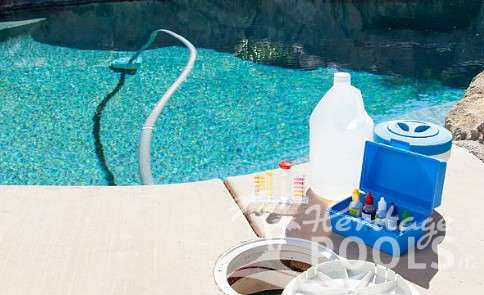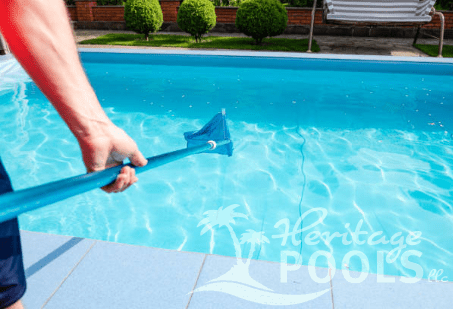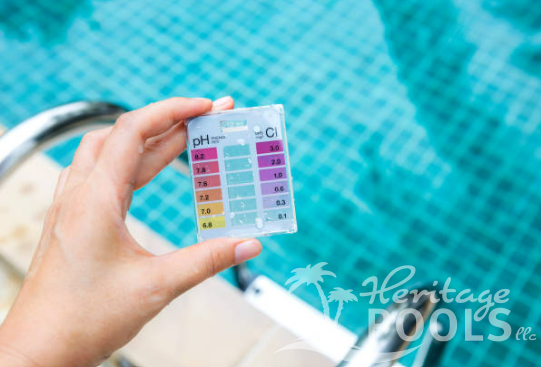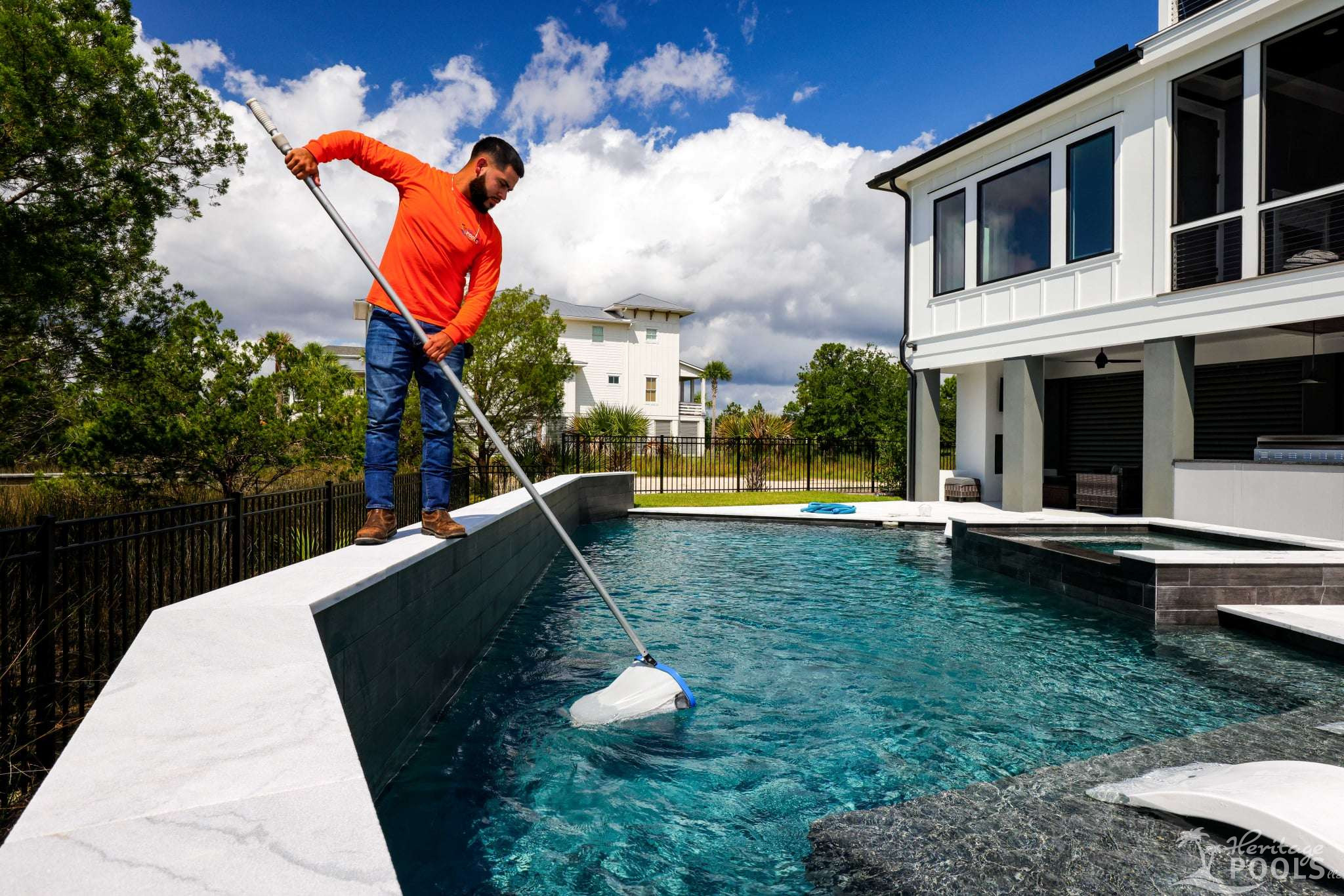Heritage Pools is a reputable and professional pool service provider located in the beautiful city of Charleston, South Carolina. Their consistent swimming pool care plan is designed to keep your pool clean and well-maintained, ensuring that your filtration system, pool finishes, and the area around your pool remain in excellent condition for years to come.
Regular pool cleaning not only enhances the overall appearance of your pool, but it also extends the life of your pool equipment, reduces the likelihood of algae growth, and helps maintain proper water chemistry.
With their expertise and attention to detail, Heritage Pools’ pool maintenance for beginners guide will ensure that your pool stays sparkling clean and safe for your family and guests to enjoy.
Table of Contents
Pool Maintenance for Beginners
Concrete, Vinyl, and Fiberglass Pools
Concrete, vinyl, and fiberglass pools all have different construction methods and materials, resulting in unique features and components.
Concrete pools typically have a gunite or shotcrete shell, with steel reinforcement and a plaster finish. The main parts of a concrete pool include the coping, which is the border around the pool, the pool deck, which is the area surrounding the pool, the tile, which lines the waterline of the pool, and the pool equipment, including the pump and filter system.
Vinyl pools consist of a steel or polymer wall structure, with a vinyl liner that covers the interior of the pool walls. The main parts of a vinyl pool include the coping, the pool deck, the liner, and the pool equipment.
Fiberglass swimming pools that are pre-manufactured and made of fiberglass-reinforced plastic. The main parts of a fiberglass pool include the coping, the pool deck, and the shell. Fiberglass pools usually have built-in steps and benches, which are molded into the shell during the manufacturing process. The pool equipment for fiberglass pools is similar to that of concrete and vinyl pools, including the pump, filter, and heater.

The Basic Components of a Swimming Pool
A typical pool consists of several main parts, each serving a specific function to ensure a clean, safe, and enjoyable swimming experience.
Pool Shell
The main body of the pool, made of materials such as concrete, vinyl, or fiberglass.
Pool Deck
The pool deck surrounds the pool and provides a space for seating and activities.
Pool Coping
Pool coping is the border that separates the pool from the deck, providing a finishing touch to the pool’s design.
Pool Filtration System
The system includes the pump, filter, and skimmer, removes debris and contaminants from the water, ensuring proper circulation and water quality.
Pool Skimmers and Returns
Pool skimmers and pool returns are essential components of any swimming pool. Skimmers help remove debris from the surface of the water, while returns help circulate the water and distribute chemicals, ensuring a clean and a healthy swimming pool environment.
Pool Water and Water Balance
pool chemicals, such as chlorine or salt, are added to the water to maintain a proper pH balance and kill harmful bacteria.
All these components work together to provide a safe, clean, and enjoyable swimming experience.

Steps to Ideal Pool Water
Maintaining clean, clear, and safe pool water is crucial to ensuring an enjoyable swimming experience. This can be achieved through good circulation, regular cleaning, and balanced chemicals.
Good Circulation
Proper circulation is essential to keep the water moving, which helps distribute chemicals and prevent the growth of algae and bacteria. The pool pump and pool filter system work together to maintain good circulation, keeping the water clean and clear.
Regular Cleaning
Regular cleaning and proper pool maintenance is necessary to remove debris, dirt, and other contaminants that accumulate in the pool. Skimming the surface, brushing the walls, and vacuuming the bottom of the pool are essential maintenance tasks that should be done weekly or as needed.
Balancing Your Water Chemistry
Maintaining balanced pool chemicals is crucial to prevent the growth of harmful bacteria and algae. This includes keeping the pH, alkalinity, and calcium hardness levels in check, as well as adding chlorine or other sanitizers to kill bacteria and other harmful organisms.
By following these three principles, pool owners can ensure that their pool water stays clean, clear, and safe for swimming. Regular maintenance, including checking and adjusting chemical levels, cleaning the pool, and ensuring good circulation, is key to enjoying a very healthy pool, and sparkling pool all season long.

Weekly Pool Maintenance Schedule
A good swimming pool maintenance and cleaning schedule involves several maintenance tasks that should be performed regularly to keep the pool clean, clear, and safe for swimming. The frequency of each task depends on factors such as the size of the pool, the amount of use, and the surrounding environment.
Skimming
Skimming the surface of the water with a net should be done daily to remove leaves, insects, and other debris that accumulate on the water surface.
Vacuuming
Vacuuming the bottom and walls of the pool is necessary to remove dirt, debris, and algae that cannot be removed by skimming. This should be done weekly or as needed.
Brushing
Brushing the walls and tiles of the pool helps prevent the buildup of algae and other contaminants. This should be done weekly or as needed.
Filter Cleaning
The swimming pool water filter should be cleaned regularly to ensure proper circulation and filtration. The frequency of filter cleaning depends on the type of filter and the amount of use, but generally, it should be cleaned at least once a month.
Chemical Maintenance
Chemical maintenance involves testing and adjusting the pH, alkalinity, and chlorine levels in the pool. This should be done at least once a week, or as needed, to ensure proper water and pool chemistry.
By following a regular cleaning schedule that includes these tasks, pool owners can ensure that their pool stays clean and safe for swimming. It is essential to maintain a consistent schedule to prevent the buildup of contaminants and bacteria, ensuring that the pool remains a source of fun and relaxation for years to come.
Summary
Maintaining a clean, clear, and safe swimming pool requires consistent upkeep and attention. By following a regular cleaning schedule, ensuring proper chemical balance, and maintaining good circulation, pool owners can enjoy a healthy and sparkling pool all season long. Skimming the surface, vacuuming the bottom and walls, brushing the pool, and cleaning the filter are all essential tasks that should be performed regularly to keep the pool free of debris, algae, and other contaminants.
Additionally, ensuring that the pool has a well-functioning skimmer and return system helps maintain good circulation and water quality. With proper care and maintenance, a swimming pool can provide a source of enjoyment, relaxation, and exercise for years to come.
By taking the time to care for the pool, owners can ensure that it remains a safe and inviting space for family and friends to gather and create lasting memories.
FAQs
What’s the proper way to clean a pool?
To clean a pool properly, skim the surface, vacuum the bottom and walls, and brush the pool weekly. Additionally, clean the pool filter regularly and maintain proper chemical balance to ensure a clean and safe swimming environment.
How often should your pool be cleaned?
A pool should be cleaned weekly to remove debris, brush the walls, and vacuum the bottom. The pool filter should be cleaned monthly or as needed to ensure proper circulation and filtration.
How do you maintain a pool for beginners?
To maintain a pool for beginners, follow a regular cleaning schedule, test and adjust chemical levels weekly, and ensure proper circulation with functioning skimmers and returns. Consistent maintenance is essential for a clean and safe swimming environment.
How do professionals clean pools?
Professional pool cleaning typically involves skimming the surface, vacuuming the bottom and walls, brushing the pool, cleaning the filter, and maintaining proper chemical balance. Professionals may also perform equipment inspections and repairs as needed to ensure optimal pool performance.
